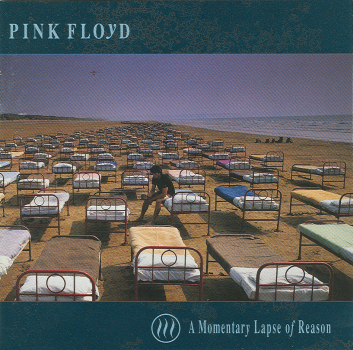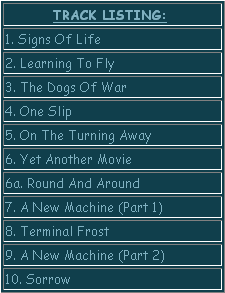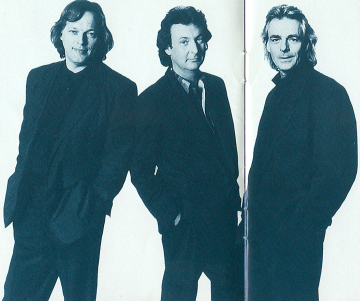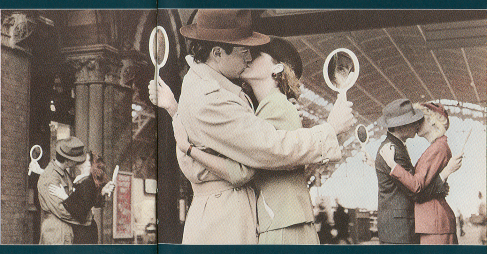
Pink Floyd - A Momentary Lapse of Reason


By 1980, Pink Floyd was one of the most popular bands in the world. Between 1973 and 1979, the band recorded four of the greatest albums ever made: Dark Side of the Moon, Wish You Were Here, Animals, and The Wall. And so, with their place in history already secured, Pink Floyd did what so many other great bands had done before them; they fucked things up in spectacular fashion. During the recording sessions for The Wall, bass player Roger Waters took on an increasingly authoritarian role in the band. After tightening his grip on the artistic direction of the band, Waters bullied bandmates David Gilmour and Nick Mason into letting him fire Rick Wright, the band's keyboardist. The reason he cited for Wright's dismissal, ironically enough, was lack of contribution. This left the band without a keyboard player for the resulting tour, so Wright was hired back as a session musician. The production costs for The Wall stage show were so high that the band actually *lost* money on the tour and had to pay the difference out of their pockets. Since Wright was no longer officially in the band, he was the only member to profit from the tour. After the tour, things only got worse. 1983's The Final Cut was a Roger Waters solo album in everything but name. Roger Waters had taken absolute control of the band, to the point where Gilmour and Mason opted to record their parts for the album separately from him. When the album was released, the egomaniacal Waters made sure everyone knew it was his album. The back cover reads: "The Final Cut - A requiem for the postwar dream by Roger Waters, performed by Pink Floyd: Roger Waters, David Gilmour, Nick Mason". After the album's release, there was no tour. Mason, Gilmour, and Waters all began working on solo projects. Waters and Gilmour's both released albums in 1984 and both did reasonably well. Gilmour's About Face peaked at #32 on the Billboard 200 and Waters' The Pros and Cons of Hitch Hiking peaked at #31. Of course, neither album did as well as a new Pink Floyd album would have. Roger's solo tour was met with poor ticket sales despite a backing band that included Eric Fucking Clapton; he lost roughly $400,000 as a result. Although the tour went badly, Waters decided that he was sick of collaborating with others and he announced his official departure from Pink Floyd in 1985. Being somewhat of an arrogant prick, Roger assumed that the band was effectively dead without him. But it wasn't.
In 1986, Gilmour and Mason decided to revive Pink Floyd without Roger Waters. Needless to say, Waters was pretty ripshit about this turn of events. Since he had written almost all of the band's lyrics, Waters believed that the Pink Floyd name belonged to him. As a result, Roger decided to sue his former bandmates over usage of the name. Unfortunately for him, Waters had severely undermined his position by publicly quitting the band. In the end, Gilmour and Mason won the right to continue on as Pink Floyd. In June of 1986, recording began on the band's thirteenth studio album, A Momentary Lapse of Reason. During these sessions, Rick Wright would eventually rejoin the band. However, failed solo projects and years of Roger's verbal abuse had eroded the self-confidence of both Mason and Wright. Subsequently, neither one made any substantial creative contributions to the album and some of the tracks feature various session players instead of them. For this reason, A Momentary Lapse of Reason is often criticized as being little more than a David Gilmour solo album. And so, one cannot discuss this album without discussing the nature of Pink Floyd and what exactly makes a Pink Floyd album.
At their absolute best, Pink Floyd's music was combined effort of Waters, Gilmour, Mason, and Wright. This is best realized on Dark Side of the Moon and Wish You Were Here. Even when Waters control of the band tightened, it was never fully his. The Wall may be Waters' concept through and through, but it is severely lacking without Gilmour's incredible guitar playing. Imagine "Comfortably Numb" without Gilmour's solos, would you still want to listen to it? If you said yes, you're either a liar or a fucking idiot. The core of Pink Floyd's success lies in the balance between Waters' lyrical intensity and Gilmour's musical superiority. Each is skilled in his own right, but neither one can be fully trusted on their own. When left to his own devices, Roger Waters has a tendency to focus too much on lyrics and not enough on musicality. The result is that Waters solo material can be somewhat cheesy at times. This is particularly prevalent on the albums Radio K.A.O.S. and The Pros and Cons of Hitch Hiking. Gilmour, on the other hand, can be boring when left on his own. Despite being a great musician, he doesn't always seem to know what makes an engaging composition. But A Momentary Lapse of Reason suffers neither of these problems. It may lack Waters' unifying vision, but it is never boring and it is certainly never cheesy, partly because Gilmour had the good sense to get Bob Ezrin to produce the album. The finished album is a masterful work that is more than worthy of inclusion in the Pink Floyd catalog. The album is, of course, hated by Roger loyalists and other assorted Pink Floyd elitists. The complaints they have against the album however are petty, spiteful, and even hypocritical. Predictably enough, critics complain that A Momentary Lapse of Reason doesn't sound like a Pink Floyd album. This assertion is laughable. Pink Floyd has constantly reinvented themselves throughout the years and to claim that there is some archetypical standard against which all Pink Floyd albums can be judged is absolutely ridiculous. After all, how similar do Atom Heart Mother and Animals sound? How would you even begin to compare the two? And in reality, A Momentary Lapse of Reason sounds very much like Pink Floyd. If you were to take Dark Side of the Moon, Wish You Were Here, and A Momentary Lapse of Reason, load them all onto an iPod playlist, then shuffle the tracks and listen to them, I don't think you'd notice huge disparity. Another complaint is that the album sounds "too eighties". And while it's not hard tell that the album was produced in 1980s, it's also not very difficult to guess when other Floyd albums were produced. But too eighties? That's not exactly fair. Gilmour and company never came close to eclipsing Tears For Fears or Phil Collins in terms of stereotypical 80s production techniques. In fact, if any album by a Pink Floyd member truly embraced insidious 1980s production values, it was Roger's Radio K.A.O.S. album. And what of the original criticism, the accusation that A Momentary Lapse of Reason is just a Gilmour solo album? This complaint, while not unfounded, is still somewhat unfair. Whereas The Final Cut did not differ much from a Roger Waters solo album in style or tone, A Momentary Lapse of Reason was a vast departure from Gilmour's About Face. Gilmour's solo album is much lighter in tone and less musically complex than his first effort as leader of Pink Floyd. About Face is downright boring, A Momentary Lapse of Reason is not. From start to finish, this is a very solid album. Let's review:

1. Signs Of Life - A Momentary Lapse of Reason opens with an instrumental, which immediately sets the tone for the rest of the album; this album is about the music. The playfully titled "Signs Of Life" harkens the listener back to the Wish You Were Here era when Pink Floyd was very much about musicality. At parts, the piece is very reminiscent of "Shine On You Crazy Diamond".
2. Learning To Fly - This was the album's biggest single and with good reason. If you've never heard this song, then you probably shouldn't been wasting your time reading this. "Learning To Fly" is an absolutely flawless track and illustrates a second key reason why Pink Floyd was able to endure without Roger Waters: David Gilmour's voice. Although Waters was more or less the band's lead singer by The Wall, Gilmour always had a much better voice. And while Roger's raspy voice did become an important part of Pink Floyd, classic songs like "Comfortably Numb" and "Us And Them" don't work without someone who can actually sing. Gilmour's vocal talents were somewhat underused on The Wall and they were not used at all on The Final Cut, but his voice was still recognizable from Dark Side of the Moon, an album that easily sold at least a couple hundred copies. For this reason too, A Momentary Lapse of Reason tends to draw comparisons to the Pink Floyd of the early 70s.
3. The Dogs Of War - This song is absolutely reviled by the pro-Waters crowd and I don't really understand why. I suppose it's largely due to the fact that it uses the word "war" and Roger's fans see it as an attempt to encroach on his apparent monopoly on the theme. And while "Dogs Of War" is not as lyrically strong as a Waters composition, the lyrics are still solid. There is additional hatred for this song from snobby progressive rock fans who think it sounds "too metal". To those people, I offer the following: if your ability to appreciate music is so dreadfully narrow that you can't appreciate a song because it kinda sorta ALMOST sounds like heavy metal, please fucking kill yourself. No one wants you around.
4. One Slip - This track bored me when I first heard it, it grew on me after about a year or so. There's some really interesting stuff happening here musically and the lyrics aren't bad either. I really don't understand why people get on Gilmour's ass about lyrics. The words are by no means dumb or trite in any regard. Besides, it's not like Roger Waters was infallible. For instance, take this excerpt from a Roger Waters song:
I awoke in a fever
The bedclothes were all soaked in sweat
She said "You've been having a nightmare, and it's not over yet!"
Then she picked up the doggy in the window
(The one with the waggly tail)
And she put him to bed between two bits of bread
These lines come from the song "Sexual Revolution" from The Pros and Cons of Hitch Hiking. Not exactly fucking brilliant, are they? And yet people will have you believe that Pink Floyd was absolutely lost without him.
5. On The Turning Away - An indictment of the self-indulgent "me first" attitude that dominated the 80s. This is the type of concept that Roger Waters would take and develop into a full-blown concept album replete with pointless reprises and obtuse metaphors. People wouldn't quite get what Roger was going for, so he'd give an interview explaining what the album was about. His fans, now with an actual understanding of his intentions, would proceed to attack his detractors with renewed condescension and claim that the album's storyline was "obvious". That may be a mean thing to say, but it's by no means inaccurate. And while I know I'm coming off as anti-Roger in this review, I'm really not. Roger's solo work is far from flawless, but it is still very good. Unfortunately, it is very hard to discuss the band's breakup or A Momentary Lapse of Reason without bashing Roger. Waters' treatment of his bandmates in the years directly before and after his departure from the band are absolutely indefensible. Similarly, to discuss the post-Waters era of Pink Floyd, one must inevitably explain why the songs are good despite his absence. One of the things that people tend to really like about Roger's work is the raw emotion. The sheer anguish in Waters' voice is often enough to carry the listener through his songs. But while Roger's music is undeniably heartfelt, some see A Momentary Lapse of Reason as nothing more than a coldly calculated attempt by David Gilmour to cash in on the Pink Floyd name. This is unfortunate, because it is absolutely untrue and nowhere is this more evident than on "On The Turning Away". David Gilmour sings this track with the type of passion that can only come from personal conviction. It's a beautiful track and it features one of Gilmour's best guitar solos.
6. Yet Another Movie/Round And Around - Not the strongest track on the album, but it's not bad. I actually like the lyrics a lot more than I like the music. One thing that bugs me about this song is that Gilmour decided to title the song's outro and give it its own listing on the album jacket. Seeing as "Round And Around" is barely half a minute in duration, I find the move to be unnecessary and rather pretentious.
7. A New Machine (Part 1) - 106 seconds of pure filler. Still, it's no worse than any of the segue tracks on The Wall.
8. Terminal Frost - When Gilmour and Mason decided to record this album, I think they had two goals. Their first goal was to give the fans a new Pink Floyd album they'd enjoy. The second was to piss off Roger Waters as much as they could. It's no coincidence that A Momentary Lapse of Reason contains two instrumental tracks, it is an obvious jab at Roger and his inability to make music part of his discourse rather than using it as the background for his discourse. Unfortunately, this track is not great. It's certainly no "Great Gig In The Sky" and it's not quite as good as "Signs Of Life" either. If you're in the right mood, this track can be all right. Sometimes I like it, other times I think it sounds like it could be an outtake from a crappy Kenny G album (i.e. any of them) or background music from The Red Shoe Diaries.
9. A New Machine (Part 2) - Filler, Part 2. It's kinda atmospheric, I guess, but it's a terrible way to lead in to the album's final track.
10. Sorrow - Along with "Learning To Fly" and "On The Turning Away", this track is one of the albums strongest tracks. Unlike the other two songs, "Sorrow" was never released as a single, a move that I never quite understood. Despite this, it managed to beat out "On The Turning Away" for inclusion on Echoes: The Best of Pink Floyd. And while the latter is a great song, the move was hardly surprisingly because Gilmour's guitar work on "Sorrow" is phenomenal.
Although it's become rather fashionable for "serious" Pink Floyd fans to hate this album, it was a huge success when it first debuted and a huge slap in the face to Roger Waters. A Momentary Lapse of Reason drastically outsold The Pros and Cons of Hitch Hiking and Radio K.A.O.S. as well as The Final Cut. Fueled by the album's success, the band embarked on one of the biggest tours in history. Originally planned to last eleven weeks, the world tour originally designed to promote A Momentary Lapse of Reason ended up playing 200 dates and lasting from almost two full years from 1987-1989. Over this two year period, Pink Floyd was the most successful touring band in the world, grossing more than Michael Jackson and U2 combined. The Gilmour-led Pink Floyd returned again in 1994 with the comparably successful album The Division Bell. An even bigger tour followed and when it ended, Pink Floyd went on hiatus. Since then, David Gilmour, Nick Mason, and Rick Wright have spent the vast majority of their time dicking around. After almost ten years doing nother, they reunited with Roger Waters on July 2, 2005 for a cocktease performance at Live 8 London. After getting everyone all excited, the band promptly announced that no album or tour would be forthcoming, not even one without Roger. Bastards.
Is A Momentary Lapse of Reason the best Pink Floyd album ever? Of course not. But if you're even interested in debating what the best Pink Floyd album ever is, you clearly don't appreciate the band in any meaningful way. Pink Floyd's albums are so stylistically varied that there is no realistic way to quantify which album is best, except for record sales. And if you're going to do that, then it's Dark Side of the Moon. In any case, A Momentary Lapse of Reason is a worthy entry the Pink Floyd discography, one that can be enjoyed but all but most the most jaded of Pink Floyd fans.
Posted by: Syd Lexia
02/04/06
